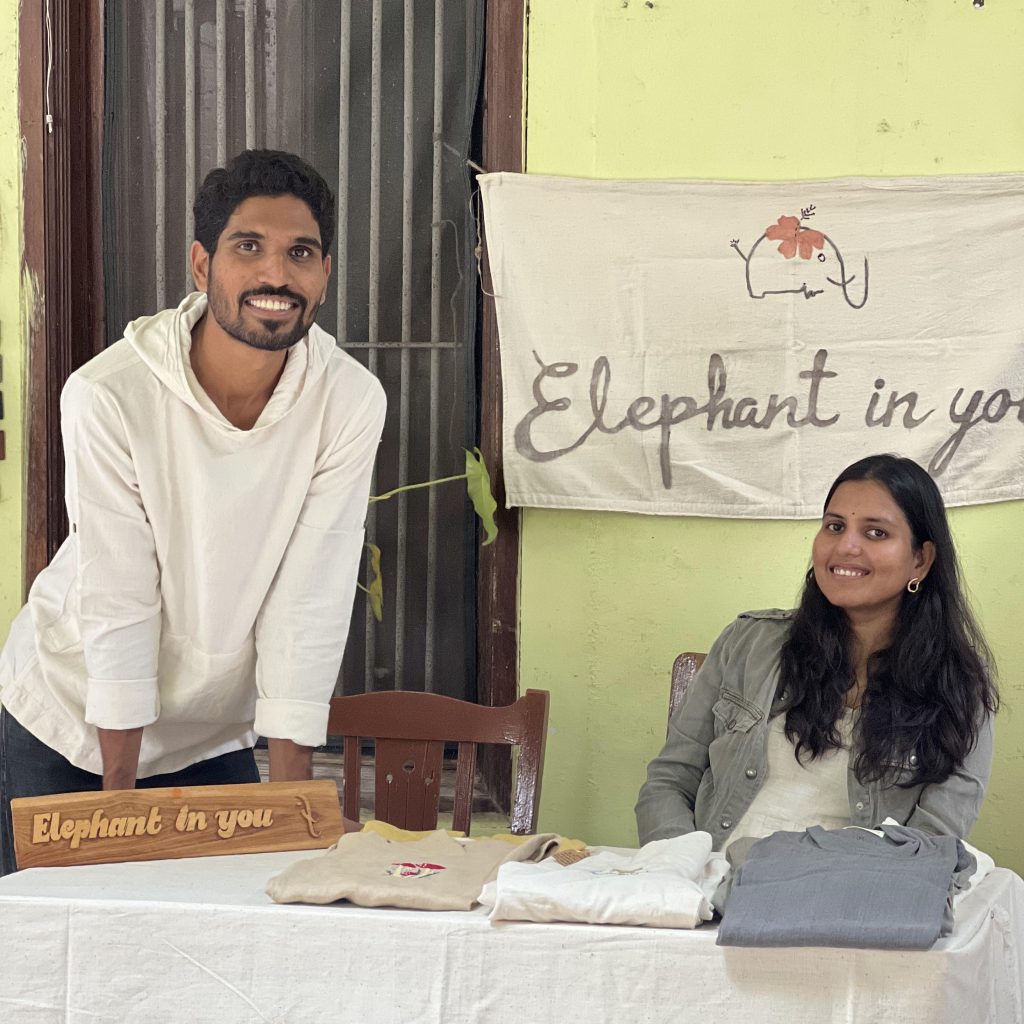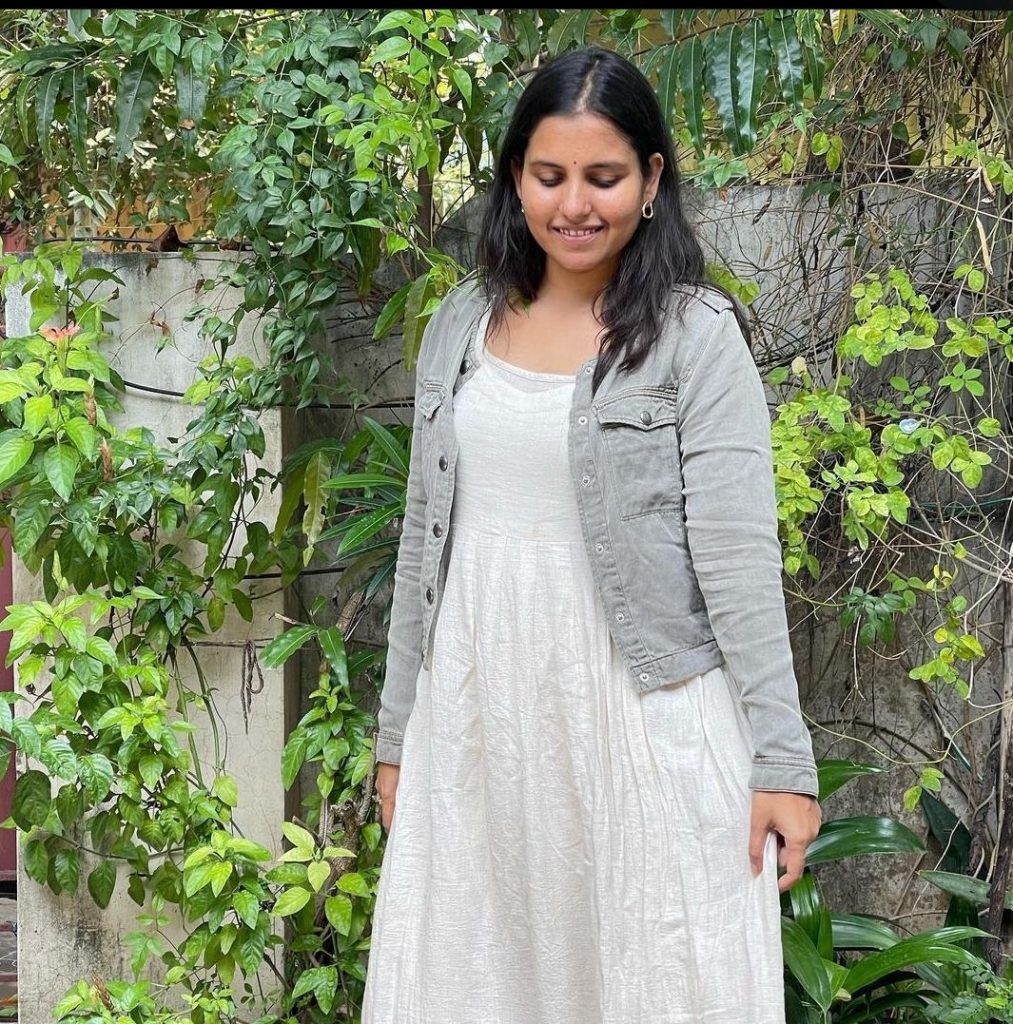In August 2020, software developers Alankrutha Chandra Tadepalli, 30, and Meher Gundavarum, 33, who lived in Chicago, US, decided to move back to their janma bhoomi, Hyderabad, and make it their karma bhoomi. The idea of relocating to India happened after the couple did a nature trip for ten days in the mid-north USA. In an exclusive with Global Indian, Alankrutha recalls, “It was a road trip, and we ate, slept, and hiked in nature. No hotel rooms, only our car, tent, water, and some local groceries and food.” This road trip marked the start of their sustainable lifestyle journey back home in Hyderabad.

Alankrutha Chandra Tadepalli and Meher Gundavarum, the founders of Elephant In You
The minimalist approach
The trip made them understand that to live well, very little was needed. The philosophy became the cornerstone as they started their ethical lifestyle brand, The Elephant in You, in December 2021. Quiz them about the name, and the entrepreneur smiles, saying, “Elephant in You is about redefining the most waste-generating activities, which are also the basis of human life (food, clothing, and housing). We are doing this for ourselves first and trying to lead an eco-friendly and sustainable life. Trying to reduce the dependency on the outer world as well as reducing the waste.”
From healthy food to eco-friendly clothes, these Global Indians grow their own produce on the eight-acre farm (in Meedigonda village) near Hyderabad and embrace a holistic lifestyle.
Back to their roots
Meher hails from an agricultural background (in Warangal, Telangana), and he was cognizant of both the joys and challenges of farm life. He observed how several relatives had gradually given up agriculture, unable to cope with the high costs.
“For us, the idea of fresh-grown organic food, chemical-free clothing, and a breathable house all seemed like a necessity to live a healthy and quality life more than anything else,” he shares. “Nothing seemed more important to us. If you think about the next generation and the quality of life they are going to lead, it feels scary. We all know our parents had better food, lived with less pollution, and drank groundwater and river water. This is not the case with us.”
The couple has converted around 3–4 acres of land into a chemical-free zone for the last two and a half years. They have their own cows, which they use to produce organic manure for the crops and fruit trees. They currently arrange day tours on the farm and are building a limestone studio that will be used for farm stays for guests.
The sustainable fashion journey

Alankrutha Chandra
The sustainable clothing range started as Alankrutha experienced frequent allergic reactions to retail clothing. To work around it, she learned to work with natural dyes by sourcing unbleached kala cotton from Khamir in Kutch, linen, cotton, and hemp from others. Today, they make a limited range of clothes for both men and women that are organic and free from chemicals.
Currently, they use rain-fed desi cotton, which is a form of organic cotton grown in Bhuj, Gujarat. The duo partners with organisations like Khamir to get the fabric needed and develop our own styles off of the fabric. They also work with linen and hemp, while their clothing lines are made out of hand-woven fabrics that appeal to a modern minimalist audience.
Alankrutha explains, “Our philosophy is the biodegradable nature of the fabric and no use of chemicals in the entire process. Also, each and every style we create can be worn in multiple ways, which promotes minimal consumption. We blame fast fashion brands for producing more, but people are buying them. Our Slow Fashion products promote the authentic products that you have to wait to get, which you can mix and match with your existing wardrobe pieces and hence add value to the wardrobe.”
A simple life
The duo was first inspired on the path of a sustainable life when they watched the documentary ‘The Hunt’. Meher explains, “We both got connected to it when we watched it in 2018. And then our love for nature began. Once you connect with nature, there is no going back. We started questioning each choice, and one by one we started making changes to reduce waste, plastic usage, opting for fresh and unadulterated foods, composting, etc.”
In India, sustainability was the central focus of everything. If one speaks to farmers now who are using pesticides and fertilisers, most of them still retain the natural methods of agriculture that were rooted in nature.
View this post on Instagram
Meher nods in agreement and says, “It’s just that systematically, the spirit of us (Indians) got destroyed. In the United States, there are systems set up for everything. It’s a little easier to follow sustainable practices. For example, we had a composting service company back in Chicago. All I needed to do was segregate the waste. They would come and pick it up and properly dispose of it. In India, the systems are not in place and need much more involvement from us.”
The couple firmly believes in actualizing change and being agents of a better life. Their way of life makes us believe Meher when he states, “Unless we take action now, it’s not possible to provide a good quality of life for them. This is our thought process. For us, nothing seemed more important than working for us, our earth, and, of course, our future generation.”
The way forward
Sustainability is a difficult aspect to implement, and since entrepreneurs aim to be completely biodegradable and chemical-free in both the products they manufacture and the lives they lead, it is a difficult way of life.
Alankrutha adds, “It is not a practical approach but an idealistic one. We have to consider material availability, carbon footprint, the way the materials are made, how biodegradable they are, how much knowledge we have to operate on the materials, how much help we seek from outside, and financial feasibility, among others. We plan to consider all these factors for future implementations, especially on the farm.”
View this post on Instagram
A fully sustainable lifestyle brings challenges every step of the way, from constructing with local materials to taking care of the farm or convincing the consumers of their clothing lines that the price they are paying is worth it.
The entrepreneurs are slowly overcoming them with grit and determination. They add, “We plan to live on the farm full time and operate from there. For that, we have to have some comfortable arrangements that need to be done on the farm. We will focus on that.”
Next on their cards: expand their clothing line by adding styles for kids, and convert the farm into a full-time educational space for people, especially kids, to come, see, and experience soil, fresh food, clothing, and natural dyes.
- Follow Elephant In You on Instagram
What’s your Global Indian journey? Write to us at editor@globalindian.com




